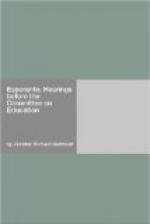Compare with this the nine yearly international Esperanto congresses held at Boulogne, Geneva, Cambridge, Dresden, Barcelona, Washington, Cracow, Antwerp, and Berne, at which from 800 to 1,500 delegates from 20 to 30 different countries spent a week in complete communion through this wonderful language. Orations, discussions, sermons, concerts, theatrical performances, and general fellowship among the members being freely enjoyed by all, and often by individuals who had only had a few weeks of acquaintance with the language.
An international language of some sort has become an absolute necessity of our new era of universal solidarity.
A hopeful sign of progress is that many international organizations have already declared in favor of Esperanto for their future meetings.
(2) The impossibility of ever making any national language international will at once become clear if we imagine the whole youth of the United States condemned to become proficient in French or Spanish or German. Say we take the easiest of them, Spanish: does anyone dream the thing possible? Only an infinitesimal fraction of our young people could attain even a smattering, and that at the cost of from two to three years’ study; and even then it is quite unlikely that other nations would adopt the same language. But if they all did this impossible thing the Spanish speaking peoples would still have the pull on them all because they grow up with the language and have not to acquire it artificially.
What holds good for Spanish holds good for even other so called natural language, including English, and more with English than any other on account of its barbarous spelling and pronunciation.
None of these objections, neither structural nor national, apply to Esperanto, which is entirely neutral and ideally simple.
(3) The U.E.A. (Universala Esperanto Asocio) has its central office at 10 Rue de la Bourse, Geneva, Switzerland. Yearly dues 50 cents for private members, $2.50 for business firms. These contributions entitle the members to use the machinery of the association for the acquisition of information—free of cost, except postage—on any subject whatever (except confidential matters), the only condition being that the request be written in Esperanto. A sufficient amount of Esperanto for this purpose can be acquired by anyone in a few days, or even in a few hours. It is not even necessary to have a teacher, the textbooks being very easy to master. In America, if local booksellers do not yet stock Esperanto literature, the would-be student may apply to Peter Reilly, Esperanto bookseller, 133 North Thirteenth Street, Philadelphia, Pa.
A growing number of Esperantists all over the world are using the services of the U.E.A., not only in correspondence, but actually traveling through many countries for pleasure or profit by means of Esperanto alone, and finding everywhere helpful hints and congenial surroundings in the local Esperanto groups.




